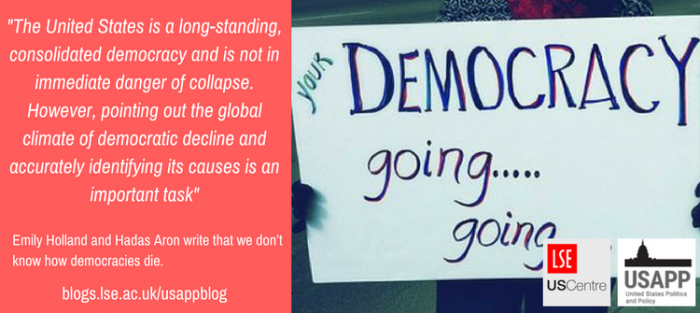
 Since the election of Donald Trump, many have expressed their concern that the United States could slip into an authoritarian backslide. Emily Holland and Hadas Aron react to this claim, most notably asserted in Steven Levitsky and Daniel Ziblatt’s new book, ‘How Democracies Die,’ noting that the decline of one of the most stable, long-lasting democracies in the world can only be compared to the decline of other lasting, consolidated democracies, of which there are none.
Since the election of Donald Trump, many have expressed their concern that the United States could slip into an authoritarian backslide. Emily Holland and Hadas Aron react to this claim, most notably asserted in Steven Levitsky and Daniel Ziblatt’s new book, ‘How Democracies Die,’ noting that the decline of one of the most stable, long-lasting democracies in the world can only be compared to the decline of other lasting, consolidated democracies, of which there are none.
How Democracies Die, a book by Steven Levitsky and Daniel Ziblatt, has been garnering much attention in recent weeks. The book warns about the possibility of a slide into American authoritarianism and draws lessons from the collapse of democracies around the world. This new release is part of an ongoing debate on whether Donald Trump is a grave danger to American democracy. Levitsky and Ziblatt are noted political scientists, with decades of important scholarship on democratic and authoritarian regimes. While the global review of cases of democratic decline is thorough and accurate, the comparisons they draw with the American case is part of an increasingly hysterical discourse on American politics by liberal commentators. The cases Levitsky and Ziblatt employ shed little light on current developments in American politics, and they neglect to identify the crucial international shifts leading to democratic decline in vulnerable countries. The United States is a long-standing, consolidated democracy and is not in immediate danger of collapse. However, pointing out the global climate of democratic decline and accurately identifying its causes is an important task.
One consequence of the frenzied tone of the debate on the fate of American democracy is serious conflation of two separate phenomenoma: populism and regime type. Throughout the world, populism is on the rise, with leaders employing exclusionary and inflammatory demagogy, and challenging liberal norms. Despite its illiberal inclination, populism is not incompatible with democracy. A populist political climate can be present in all regime types, and does not necessarily involve democratic decline. The countries that are most vulnerable to populist democratic decline are simply those that are most vulnerable to democratic decline in general. These include both new democracies and those that have suffered from long-term instability. To point out the dangers facing the United States, Levitsky and Ziblatt discuss cases as varied as Russia, Poland, Turkey, and Nicaragua. Russia and Turkey have never been consolidated democracies; one could argue that they have never been democracies at all. The recent populist turn experienced in these states is simply another phase on a long path of non-democracy and instability. Poland is a relatively new democracy and, despite the rise of very radical populism, is still a democracy by any measure. It remains to be seen whether this will change in the following years, but classifying Poland as a non-democracy is simply inaccurate.
Of the cases Levitsky and Ziblatt use, the two most relevant are those of Venezuela and Sri Lanka. Both countries transitioned during the second wave of democratization in the post-World War II era and remained promising democracies for several decades. As they point out, both countries’ slide into authoritarianism occurred legally within the framework of the democratic system. However, the context of democratic decline in both cases is completely irrelevant to comparison with the United States. Venezuela has been plagued with instability and coup attempts. In recent years the economy became completely dependent on hydrocarbons, and as a result, the fate of the country became tied to the global price of oil. Sri Lanka suffered from both the legacies of colonialism and protracted civil war. In addition, both countries are highly corrupt.

“Democracy Going” by JmacPherson is licensed under CC BY 2.0
In fact many of the cases of democratic backslide pointed out by Levitsky and Ziblatt are countries that suffer from endemic corruption. The corruption in states like Russia, Ukraine, Venezuela and others is not simply a flaw of the system, but rather it is the main feature of the political process itself. Corruption is the means by which politics and the economy are conducted and is probably one of the most stable institutions in these states. The rise of populism and the associated increase in crony capitalism has increased the opportunities for transnational corruption and is extremely damaging to democratic processes. But this type of corruption is fundamentally different from concerns over corruption in the American political system. To be sure, President Trump’s refusal to disentangle his business interests from his office erodes trust in American institutions. Campaign finance is in need of profound reform, but there is no comparison between the over representation of capital in the American political system and capital being the political system. Endemic corruption is particularly dangerous to democracies because it leaves them vulnerable to backroom deals, a lack of transparency, and capitulation to the highest bidder.
Looking at demagogue leaders and deeply polarized political systems can shed light on the current state of American politics. Certainly President Trump has disrespect for the norms of democracy and continues to foment polarizing sentiments. This political climate makes it difficult to make decisions through compromise as the Madisonian model intended. Trump is driving American politics away from liberal norms of tolerance, freedom of the press, and judicial independence. This is clearly troubling and deserves attention, but does not amount to democratic death. The United States is one of the most stable, long-lasting democracies in the world. As such it is not exceptional, but it is comparable in regards to democratic death only to other long-lasting, stable democracies. History does not provide us with examples of the death of long-lasting, stable democracies.
We don’t know how consolidated democracies die, but we do know how empires and world systems collapse. Empires collapse when power shifts in a different direction and they cannot adjust to new technological, economic, and military circumstances. It is unclear if we are in the midst of a fundamental shift in the world order, but we certainly should be paying attention to the signs. In the past decade, Russia has been playing an increasingly assertive role on the world stage. China has been expanding its diplomatic efforts throughout the globe, and is now an economic powerhouse, and a technological and environmental leader. The most notable arena for this global shift in power is the Syrian Civil War, where the United States has capitulated to Russian interests, reinforcing Russia’s aggressive tactics. Most significantly, both Russia and China offer an alternative model of governance to Western liberal democracy. The model has already been emulated by multiple populist governments including Hungary, India, and Turkey. Here lies the great danger of the populist turn: the battleground is vulnerable democracies, and the United States is consciously neglecting its role as a defender of democracy. In this, President Trump continues President Obama’s turn towards isolationism, and the consequences of the US withdrawal from world leadership are only now beginning to emerge. Levitsky and Ziblatt rightly identify the severe consequences of American isolationism, but their analysis fails to identify the problem.
Please read our comments policy before commenting.
Note: This article gives the views of the author, and not the position of USAPP – American Politics and Policy, nor of the London School of Economics.
Shortened URL for this post: http://bit.ly/2EvsEVU
_________________________________
About the authors
 Emily Holland – Harvard University
Emily Holland – Harvard University
Emily Holland is a Post-Doctoral Fellow at Harvard University’s Davis Center for Russian and Eurasian Studies and an Assistant Professor at the United States Naval Academy, specializing on Russian foreign policy, populism and corruption. Her book project, entitled Poisoned by Gas: Institutional Failure, Energy Dependence and Security elucidates the relationship between foreign policy, domestic politics and the natural gas trade in the post-Soviet region.
 Hadas Aron – Tel Aviv University
Hadas Aron – Tel Aviv University
Hadas Aron is post-doctoral fellow at Tel Aviv University and an Associate Research Scholar at Columbia University’s Saltzman Institute of War and Peace Studies, specializing on populism, nationalism and democracy. Her book project, An Ethno-Nation Deeply Divided- The Center Periphery Cleavage and the Rise of Right Wing Populism in East Central Europe, explains the penetration of right wing populism into the mainstream and the variation in its transformative effect on political systems.







A “slide into authoritarianism”? Really? Newsflash – this has already happened under Bush I, Clinton, Bush II and Obama. Americans have already lost many rights to the increasingly power State, under the misnamed Patriot Acts I and II, and Obama’s NDAA.
One example of many: the protection under the Bill of Rights against illegal search and seizure. This right is now long gone, as police and other agents of the State all over the country have seizes billion$ of dollars from citizens with no trial, and no due process.
Another example: war is such a terrible thing with unknowable consequences that the Founding Fathers made sure that only Congress could get us into war… yet look at Obama’s butchery of Libya and the Libyan military, without a declaration of war or anything else, other than an invented mandate to “protect civilians”, which they took to mean that they could destroy Libya’s military and civilian infrastructure, including waterways and water conduit factories. Of course, Bush I, Clinton and Bush II are also quite guilty in this regard for their own military adventurism.
One example of many: the protection under the Bill of Rights against illegal search and seizure. This right is now long gone, as police and other agents of the State all over the country have seizes billion$ of dollars from citizens with no trial, and no due process.
Another example: war is such a terrible thing with unknowable consequences that the Founding Fathers made sure that only Congress could get us into war… yet look at Obama’s butchery of Libya and the Libyan military, without a declaration of war or anything else, other than an invented mandate to “protect civilians”, which they took to mean that they could destroy Libya’s military and civilian infrastructure, including waterways and water conduit factories. Of course, Bush I, Clinton and Bush II are also quite guilty in this regard for their own military adventurism.
Venezuela was in full democratic backsliding well before the price of oil collapsed them. I get the sense these authors read the inside flap of the book, but not the book itself. Consider the example of Venezuela, in which they discuss how Hugo Chavez came to power. He installed himself as a strongman by defeating the establishment and co-opting them to his own agenda. They in essence, handed him the keys to the kingdom and failed to serve as gatekeepers against someone with clear authoritarian tendencies, sound familiar? Also, the authors of this post makes it seem like corruption occurs out of thin air. It occurs when the wheels of the state collude with private enterprise to line their own pockets. This is done by “capturing the referees,” which is specifically mentioned by Ziblatt and Levitsky.
Seems to me US is a very corrupt democracy already;but will become even more corrupt. I do not think there will be an authoritarian. Certainly there is a very string security State;but it requires major govt spending, which I thing will soon diminish greatly because of demographic changes underway and because the petrodollar USD depends on will dissolve along with the incompetent Saudi’s debacle.
US system will not have the carrying capacity it needs, because of major demographic changes underway.
Thanks to segregation-majority of Americans in younger generations are getting substandard education. It will become the first rich country in modern era to descend into the low capacity population norm of a developing country. It needs to do major capacity building;but is wasting funds on wrong priorities because still clinging to fast fading status quo.
The argument proposed here seems to be a profound leap of faith. Since no examples exist in the historical record of long-term, stable democracies failing, we can be sure that the United States is not in any danger of losing its democracy in the near future; the ONLY battleground is in feeble democracies. Never-mind that the US us barreling towards a one party state. Never-mind that the Trump Administration has fragrantly defied a federal court order to return migrant children to their parents by a set deadline. Never-mind that one political party is consciously attempting to deny citizens the franchise. All of these things merely represent a disrespect for democratic norms, not an actual threat to democracy itself. I think that the authors are too self-assured. I would actually argue that the US is a relatively new and fragile democracy.
Never-mind that the US us barreling towards a one party state
How on earth do you conclude that? The Democrats hold the House of Representatives. They stand an excellent change of flipping the Senate, and regardless of whether they succeed outright, they will pick up seats there. They are consistently ahead in polls on the presidential race. The Democrats hold 24 governorships, the Republican 26 — pretty close to even. According to the National Council of State Legislatures (NCSL), state legislatures are a little less balanced, at roughly 60% controlled by the GOP and 40% by Democrats, but that’s still hardly a “one party state.”